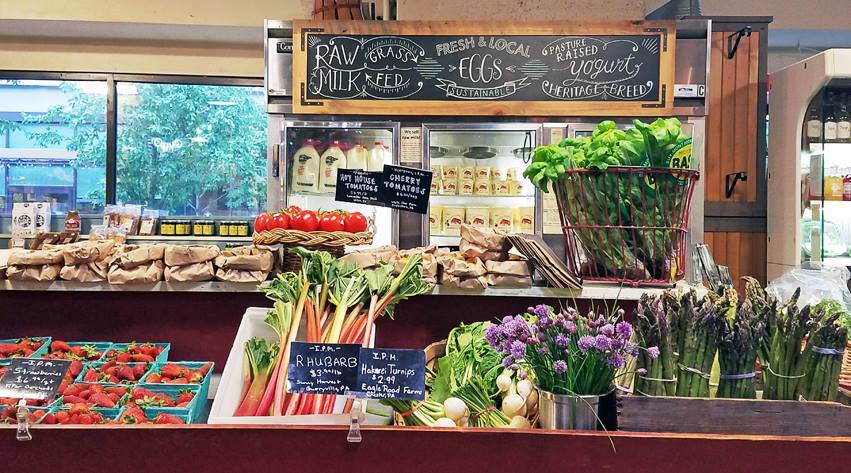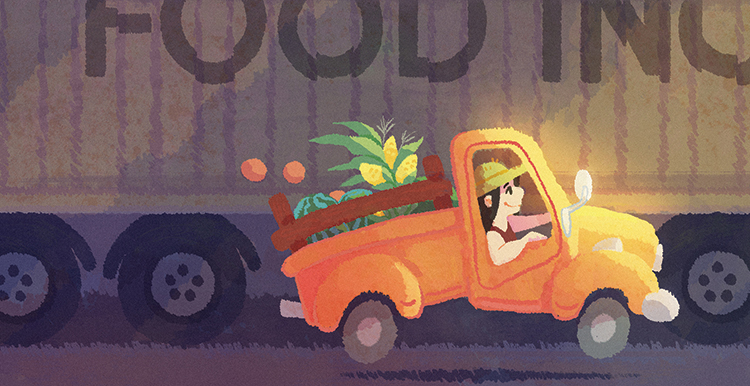Illustration by Hilary Sedgwick
by Sara Schwartz
Ice cream is, as Jen Satinsky says, the “total comfort food.” You reach for it when you’re feeling blue, it’s the encore to birthday cake, and a treat to indulge in on a hot day. It’s also, according to Jen, a great way to showcase the brilliance of a single ingredient. Armed with this vision, Jen and her husband, Andrew Satinsky, created Weckerly’s Ice Cream in early 2012. They chose to sell the small-batch ice cream at the Green Line Café in West Philadelphia. When it came time to start sourcing ingredients, going the local route “was a no-brainer,” Jen says. “I love using local and seasonal ingredients—it only makes the ice cream better.”
Because Jen had worked as a pastry chef for over a decade at the White Dog Café, she had connections with some local food providers. The White Dog, founded by sustainability leader Judy Wicks in 1983, was a trailblazer in sourcing locally, its success led Wicks to found Fair Food in 2000 and share what she had learned.
While the Satinskys utilized their personal connections for about a year, they wanted to work with a larger number of farms and fair-trade sources, so they became members of Fair Food in March 2013. Fair Food introduced them to the Lancaster Farm Fresh Cooperative, and soon Weckerly’s began using cream from one of its suppliers, Seven Stars. The high butterfat product comes from grass-fed cows on a biodynamic farm 40 miles from Philadelphia.
“Before working with Fair Food, we bought cream from a variety of local sources, but saw no consistency of quality, nor were we able to build a relationship with a single source of our most important ingredient,” Andrew says. “Not only has the organic cream improved the quality and flavor of our ice cream, but it has given us the opportunity to work with a very local farm whose managers and owners have set a high bar in the area’s premium dairy sector.”
It’s a common story for many restaurants and companies in and around Philadelphia. Since 2000, Fair Food has helped hundreds of producers—from limited-acre farms to large-scale wholesale suppliers—grow their business by being what they call “value chain facilitators,” which is just another way of saying that they connect those that need to those that provide—while keeping it sustainable and local. And Fair Food maintains objectivity by not accepting a commission from the supplier, giving them a level of impartiality that’s important to their members.
The relationship between Weckerly’s and Fair Food didn’t end there. Over the past year and a half, Fair Food Executive Director Ann Karlen and Farmstand Product Manager Alex Jones put the Satinskys in touch with more farms. That meant that Weckerly’s was able to purchase “the best” seasonal fruits and herbs without wasting time trying to research each farm on their own. Organic cream, seasonal fruits, cocoa and vanilla beans, and eggs for the custard all contribute to the popular French-style ice cream.
Weckerly’s now purchases food from the variety of farms and distributors that they had hoped to find. They buy directly from Three Springs Fruit Farm, Beechwood Orchards, Paradise Hill Farm, Brogue Hydroponics and Green Meadow Farm, and Shellbark Hollow provides the goat milk for Weckerly’s caramel ice cream. They continue to buy dairy from Seven Stars and Maplehofe Dairy through the Lancaster Farm Fresh Cooperative, which, in addition to Common Market, also provides some produce.
For LFFC, working with Weckerly’s had a familiar feel. “It’s great. It’s just like an extension of the family,” says Casey Spacht, general manager of LFFC. He adds that they’re always looking for new products that Weckerly’s can incorporate into their ice cream: “We love their ice cream, everybody here raves about it.”
The nonprofit farmer-owned organic co-op has worked with Fair Food since 2006, when the cooperative was just nine farmers. Today they boast a network of approximately 90 member farmers and work with more than 100 others that they purchase from and support during the year. LFFC prides itself on working with small family farms; Spacht says that the largest farm is 35 acres. Working with Fair Food has helped to cultivate the local food system and empowered LFFC, Spacht says. “As a direct result of their work, we’re seeing a resurgence of family farmers,” he says.
That is music to Karlen’s ears. “Our goal is twofold: to grow the market demand for local food and to facilitate the relationships to bring that food to the marketplace,” she says. “For Weckerly’s, that meant a relationship to us as a middleman for Seven Stars cream, but over time the appropriate business relationship shifted to be with [Lancaster Farm Fresh Co-op].”
Weckerly’s is equally excited about the work that Fair Food does in supporting all sides. “What impresses me the most is that [Fair Food is] able to make these connections and speed up the process without removing the human element,” Andrew says. “Fair Food spends just as much time making sure that their producer members remain connected to the sources of their ingredients. This has helped Jen and I to build relationships through the process, and given us a great deal of fulfillment in the daily operations of our business.”
That success happened in part because of Weckerly’s dedication to local, Jones says. “While we’re happy when any buyer is doing more local purchasing, the Satinskys really built their business around this high-integrity philosophy that using the best ingredients in season and forming strong relationships with suppliers leads to the best product,” she says.
Fair Food looks to a future where more businesses take advantage of their network. “There’s such a great need right now for farms and food artisans to not just produce great food, but run sustainable businesses,” Karlen says.
Story by Sara Schwartz, illustration by Hilary Sedgwick






